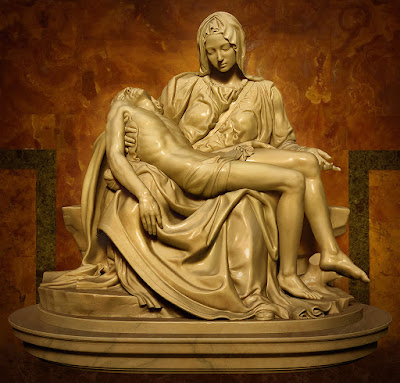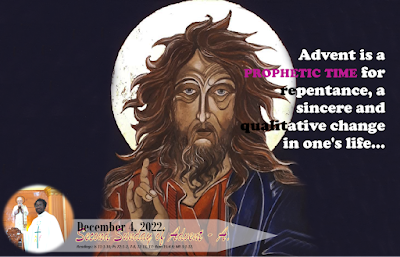TO BE: THE MYSTERY OF HUMAN DEATH.
June 27, 2021.
Thirteenth Sunday in Ordinary Time – B.
A Kikuyu proverb says, “Death is like a dress that, at some
point or another, everyone has to wear.” And a Rwandese proverb adds, “A friend
who visits you when you are suffering is your best friend.”
I thought of the Pieta. I thought of death. I thought of
Mary holding the lifeless body of her son, the Son of God and I questioned, is
there a mystery greater than death? And because it remains a deep mystery, we
can prevent asking, why do we suffer? Why is life so hard? And even more, why
do we die? Has God created man for suffering and death? In confront with
suffering and death, we find ourselves always with those questions. We hardly
understand and accept the reality of death. Where is it from, and why do we
have to endure it? Is God taking any pleasure to see us dying? If so, which
kind of God is he then?
A few years back, a sad polemic rose here in the Philippines
because of an out-of-context comment of the president on the book of Genesis,
the origin of sin, the story of Adam and Eve. The president questioned God
stating that it must be "Stupid" for a good father to create
something great and later doom it to damnation. His words have hurt the
Christians in their great majority, and Catholics the more. A movement rosed
where people defended that "God was not stupid". That is the basic
truth. Our God is not stupid. He could have not created us for life and doom us
to death. God is not responsible for our death. Then the question, if so, who
then is guilty? From where does death come?
The liturgy, on this 13th Sunday of the ordinary time B,
provides great answers to our existential questions. The author of the book of
Wisdom, in the first reading, states straight forward, “Death was not God's
doing, he takes no pleasure in the extinction of the living.” If we suffer and
die, it is not God's fault. He made us for life, as say the Scriptures.
Therefore, God suffers with us when we suffer. We could quote Ezekiel 18:23
where the Lord says, “Do I find pleasure in the death of the wicked—oracle of
the Lord GOD? Do I not rejoice when they turn from their evil way and live?”
So, that is clear, God is not responsible for our death.
What he wants of us are conversion and repentance. Why thus do we die? The book
of Wisdom answers, it was “by the envy of the devil, death entered the world,
and they who belong to his company experience it.” We die by the fault of the
devil and by our freedom leading us to enter in partnership with him. We die
because of our sins. St. Paul wrote, "the wage of sin is death"
(Romans 6:23). The first greatest sin, called the original sin, was the
disobedience of Adam and Eve to God's will. Their free will, our freedom
choices are the reasons for our death.
Nevertheless, God who has not created us for death will not
remain inactive when we are brought to face it. He will always extend his
healing hand and bring us back to the newness and life. Jesus raises to life
the daughter of Jairus and heals the woman with hemorrhage to tell us that God
takes no pleasure in our sufferings. If disobedience has led us to sin, and sin
to its consequences that are sufferings and death, faith will open us to a new
life and restoration.
The faith of Jairus and that of the woman in the Gospel have
won for each of them what they needed, healing and restoration or resurrection.
Faith in Christ is the price for our salvation. Jesus humble himself and shared
in our humanity, until suffering and death to teach us God's compassion and
closeness to those who suffer. By putting our faith firmly rooted in him, no
matter the suffering we go through, we will never find ourselves forsaken by
God. For suffering, when faced alone, is hell, but when faced with Christ and
with faith, it opens to new life. The hemorrhagic woman was brought from the
hell of isolation and suffering to life through a faith: “If I but touch his
clothes, I shall be cured.” And Jesus attested of that, saying, “Daughter, your
faith has saved you. Go in peace and be cured of your affliction.” He also
calls us to rise in faith, “Talitha koum”.
The Lord suffers with us, he shares in our trials. We should
also see it as an invitation to support our fellows in their sufferings. Any
suffering is made more bearable when it is suffered together with others and
when we express what we are experiencing with them out of compassion. We are
called to share our suffering with Christ on the cross, so why not share also
in the trials of those around us, bearing their cross with them?
St. Paul will make it a call for you and me while addressing the Corinthians. He says if that is that we are perfect in every respect, in faith, discourse, knowledge, all earnestness, and in the love, we should also excel in gracious acts. We are urged to excel in compassion just as God, through Christ is compassionate with us. Jesus humbled himself and shared in our lowliness because of God’s compassionate love. We should in return burn of the same love for all who suffer, humble ourselves, and serve and love them the way we are love. God does not take pleasure in our death; may we also not find any pleasure in the suffering and death of our brothers and sisters.





Comments
Post a Comment